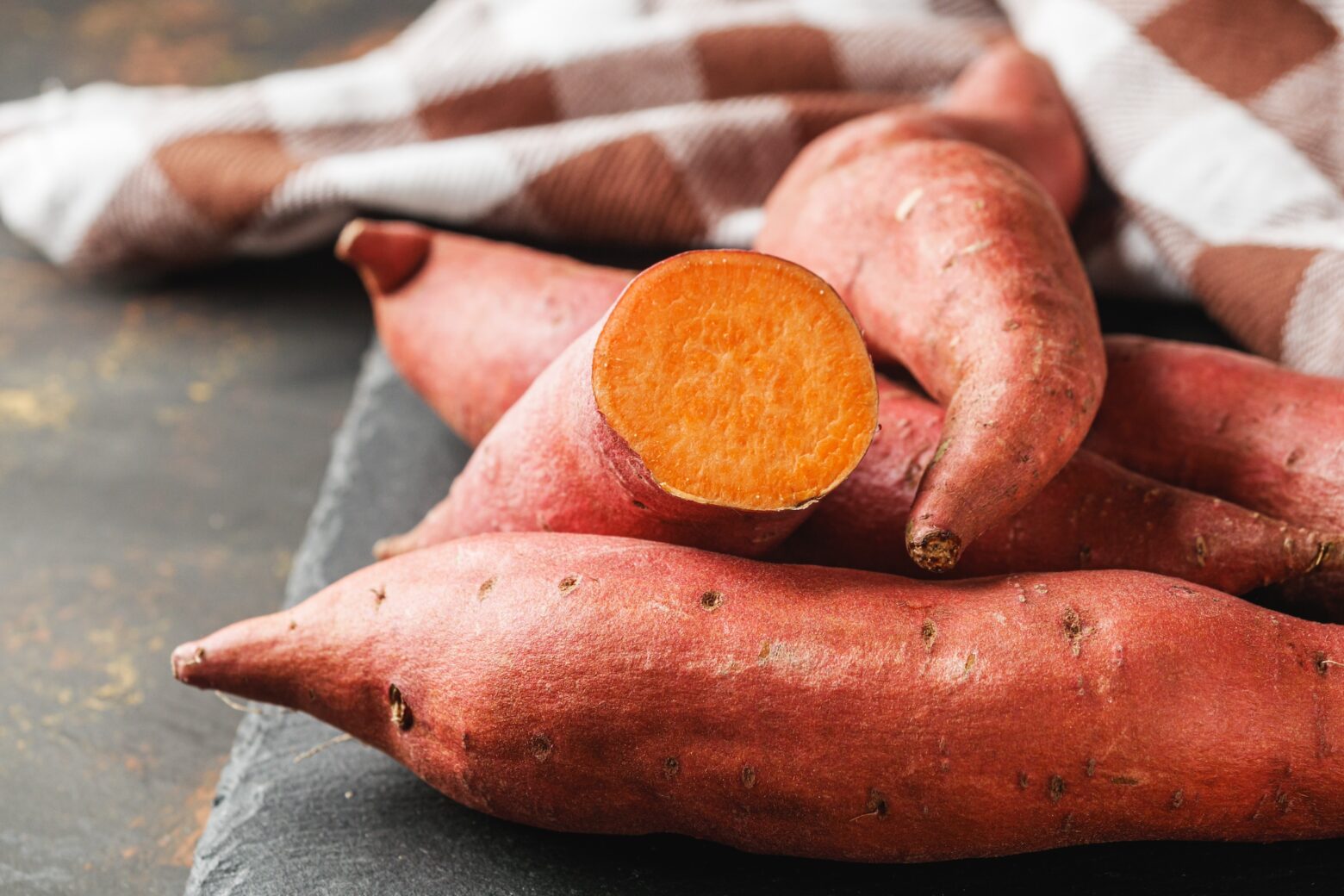Culinary Tips and Health Benefits of Sweet Potatoes

In autumn, pumpkins get all the glory, but sweet potatoes are a nutritional powerhouse also worthy of celebration. These root vegetables, often associated with holiday feasts, have a culinary versatility that extends far beyond Thanksgiving dinner.
These vibrant tubers are packed with vitamins, minerals, and antioxidants, and offer a wide array of health benefits, from boosting your immune system and fighting cancer to supporting your gut, heart, and eyes. Learn more about the uses and health benefits of sweet potatoes below.
How Sweet Potatoes Are Grown
While sometimes called yams in North America, sweet potatoes are actually a different species altogether. [1] They’re not related to white potatoes either, despite the similar name. These naturally sweet roots belong to the Morning Glory family [2] and have been cultivated for centuries, dating back to 750 B.C. in Peru.
While sweet potatoes thrive in warm climates, with at least four months of warm weather and soil, they’re surprisingly adaptable. These hardy plants can tolerate drought and heat, and they’re relatively pest and disease resistant.
We typically associate sweet potatoes with their bright orange color, but they actually come in a variety of shades, including white, red, pink, violet, yellow, and purple.
Health Benefits of Sweet Potatoes
Sweet potatoes are nutritional superstars that can elevate almost any diet. They are an excellent source of beta-carotene, [3,4] an antioxidant that your body converts into vitamin A. [5,6] Just 100 grams of sweet potato provides the daily recommended amount of this vitamin.
They’re also a good source of manganese, an essential mineral that may help reduce inflammation and assist in the metabolism of carbohydrates and cholesterol, according to Michelle Routhenstein, MS, RD, CDCES, CDN, preventative cardiology dietitian at EntirelyNourished.com. Additionally, sweet potatoes provide “copper, B6, potassium, and fiber, all of which together support heart, eye, brain, skin, and immune health,” she says.
RELATED: 6 Reasons to Eat Sweet Potatoes
One sweet potato also provides about 2 grams of protein and 26 grams of carbohydrates, and they’re low in fat. Below are some other notable benefits.
Promote a Healthy Gut
Studies suggest that the fiber in sweet potatoes acts as a prebiotic, meaning it helps nourish the beneficial bacteria in your digestive system. [7] This can lead to improved digestion and overall health.
Research also suggests that sweet potatoes can strengthen your intestinal barrier, which is the protective lining that allows your body to absorb nutrients and block harmful substances. [8] In fact, sweet potatoes have traditionally been used to help with digestive issues like diarrhea and other stomach problems.
Give Your Immune System a Boost
Vitamin A is essential for a healthy immune system, and low levels have been linked to reduced immunity. [9] It’s also crucial for maintaining healthy mucous membranes, especially in your gut. [10] Studies have shown that vitamin A deficiency can increase gut inflammation and weaken your immune response.
They also contain about 30% of your daily value for vitamin C, a powerful antioxidant that protects your cells from damage caused by environmental stressors. It’s also essential for healthy skin, strong joints, and a robust immune system.
While more research is needed to determine the specific effects of sweet potatoes on immunity, including them in your diet regularly can help ensure you’re getting enough vitamin A and supporting your overall health.
May Have Anti-Cancer Properties
Oxidative damage to cells has been linked to an increased risk of cancer, a disease characterized by uncontrolled cell growth. Diets rich in antioxidants, like the carotenoids found in sweet potatoes, have been associated with a lower risk of certain cancers, including stomach, kidney, and breast cancers. [11,12]
Studies suggest that the potent antioxidants in sweet potatoes may be the reason for this reduced risk of cancer, with purple sweet potatoes showing the highest antioxidant activity.
Good for Eye Health
The beta-carotene in sweet potatoes is essential for maintaining healthy eyesight. In fact, severe vitamin A deficiency can lead to blindness, a serious concern in some parts of the world. Eating foods rich in beta-carotene—like orange sweet potatoes—can help prevent this condition. [13]
Interestingly, purple sweet potatoes also offer vision benefits. Studies suggest that the anthocyanins in purple sweet potatoes may help protect eye cells from damage, contributing to overall eye health.
RELATED: What Is Ube and How to Cook It
May Benefit Brain Function
Purple sweet potatoes may also offer benefits for your brain. Animal studies suggest that the anthocyanins in purple sweet potatoes can help protect the brain by reducing inflammation and preventing damage from free radicals. [14]
While research in humans is still needed, diets rich in fruits, vegetables, and antioxidants, like those found in sweet potatoes, are generally associated with a lower risk of cognitive decline and dementia.
Sweet Potatoes vs. White Potatoes
Both white potatoes and sweet potatoes have similar amounts of water, carbs, fat, and protein, but sweet potatoes have a lower glycemic load and are richer in fiber. [15,16] Both types of potatoes are good sources of vitamin C and potassium, but sweet potatoes stand out due to their high beta-carotene content, which your body converts into vitamin A.
RELATED: 4 Easy Ways to Replace Potatoes
While white potatoes might be more filling, they also contain compounds called glycoalkaloids, which may be harmful in large amounts. [17] The combination of fiber, vitamins, and antioxidants makes sweet potatoes a nutritious and versatile addition to a healthy diet.
How to Select and Store Sweet Potatoes
Sweet potatoes are available year-round, but they are at their peak during the winter months. [18] When selecting them, opt for small- to medium-sized sweet potatoes that feel heavy for their size. Avoid those with bruises, soft spots, or any signs of sprouting.
Orange-fleshed sweet potatoes should have uniformly colored skin, and the skin of light sweet potatoes will be naturally more mottled. Store them in a cool, dark, dry place to keep them from sprouting, and use them within two to three weeks. Avoid storing them in the refrigerator because cold (not cool) temperatures will cause changes to the starch of the potato, making it hard in the middle and producing an unpleasant flavor. [19]
How to Cook Sweet Potatoes
Though often enjoyed during the holidays, sweet potatoes are a versatile and delicious addition to any meal year-round. Enjoy them boiled, baked, steamed, or even oven-fried for a nutritious and satisfying side dish.
While boiling often depletes nutrients in food, it’s actually the best way to cook sweet potatoes if you want to maximize their beta-carotene content. [20] Boiling not only preserves this important antioxidant but also makes it easier for your body to absorb.
Interestingly, research also suggests that air-frying sweet potatoes preserves more beta-carotene compared to baking. So, if you’re looking for a healthy and delicious way to enjoy sweet potatoes, consider boiling or air-frying them. [21]
No matter how you choose to prepare them, Routhenstein recommends keeping the skin on to reap the full benefits of sweet potato’s fiber, vitamins, and antioxidants.
References
- Sweetpotatoes 101 – North Carolina Sweetpotatoes [Internet]. North Carolina Sweetpotatoes. 2023 [cited 2024 Nov 11]. Available from: https://ncsweetpotatoes.com/sweetpotatoes-101/
- Old Farmer’s Almanac. Sweet Potatoes [Internet]. Old Farmer’s Almanac. 2019. Available from: https://www.almanac.com/plant/sweet-potatoes
- Teow CC, Truong VD, McFeeters RF, Thompson RL, Pecota KV, Yencho GC. Antioxidant activities, phenolic and β-carotene contents of sweet potato genotypes with varying flesh colours. Food Chemistry [Internet]. 2007 Jan;103(3):829–38. Available from: https://www.sciencedirect.com/science/article/pii/S0308814606007564
- Mohanraj R, Sivasankar S. Sweet Potato (Ipomoea batatas[L.] Lam) – A Valuable Medicinal Food: A Review. Journal of Medicinal Food. 2014 Jul;17(7):733–41. https://pubmed.ncbi.nlm.nih.gov/24921903/
- van Jaarsveld PJ, Faber M, Tanumihardjo SA, Nestel P, Lombard CJ, Benadé AJS. Beta-carotene-rich orange-fleshed sweet potato improves the vitamin A status of primary school children assessed with the modified-relative-dose-response test. The American Journal of Clinical Nutrition [Internet]. 2005 May 1 [cited 2020 Mar 4];81(5):1080–7. Available from: https://pubmed.ncbi.nlm.nih.gov/15883432/
- Nestel P, Trumbo P. The role of provitamin A carotenoids in the prevention and control of vitamin A deficiency. Archivos latinoamericanos de nutricion [Internet]. 1999 Sep;49(3 Suppl 1):26S33S. Available from: https://pubmed.ncbi.nlm.nih.gov/10971840/
- Cao Y, Tian B, Zhang Z, Yang K, Cai M, Hu W, et al. Positive effects of dietary fiber from sweet potato [Ipomoea batatas (L.) Lam.] peels by different extraction methods on human fecal microbiota in vitro fermentation. Frontiers in Nutrition. 2022 Sep 7;9. https://pubmed.ncbi.nlm.nih.gov/36159459/
- Parveen A, Choi S, Kang J, Seung Hyun Oh, Sun Yeou Kim. Trifostigmanoside I, an Active Compound from Sweet Potato, Restores the Activity of MUC2 and Protects the Tight Junctions through PKCα/β to Maintain Intestinal Barrier Function. International Journal of Molecular Sciences [Internet]. 2020 Dec 30 [cited 2023 Sep 29];22(1):291–1. Available from: https://www.ncbi.nlm.nih.gov/pmc/articles/PMC7794767/
- Huang Z, Liu Y, Qi G, Brand D, Zheng S. Role of Vitamin A in the Immune System. Journal of Clinical Medicine. 2018 Sep 6;7(9):258. https://pubmed.ncbi.nlm.nih.gov/30200565/
- de Medeiros P, Pinto D, de Almeida J, Rêgo J, Rodrigues F, Lima A, et al. Modulation of Intestinal Immune and Barrier Functions by Vitamin A: Implications for Current Understanding of Malnutrition and Enteric Infections in Children. Nutrients [Internet]. 2018 Aug 21 [cited 2019 Nov 6];10(9):1128. Available from: https://www.mdpi.com/2072-6643/10/9/1128
- Larsson SC, Bergkvist L, Näslund I, Rutegård J, Wolk A. Vitamin A, retinol, and carotenoids and the risk of gastric cancer: a prospective cohort study. The American Journal of Clinical Nutrition. 2007 Feb 1;85(2):497–503. https://pubmed.ncbi.nlm.nih.gov/17284749/
- Eliassen AH, Hendrickson SJ, Brinton LA, Buring JE, Campos H, Dai Q, et al. Circulating Carotenoids and Risk of Breast Cancer: Pooled Analysis of Eight Prospective Studies. JNCI: Journal of the National Cancer Institute. 2012 Dec 18;104(24):1905–16. https://pubmed.ncbi.nlm.nih.gov/23221879/
- Chiu M, Dillon A, Watson S. Vitamin A deficiency and xerophthalmia in children of a developed country. Journal of Paediatrics and Child Health. 2016 Jul;52(7):699–703. https://pubmed.ncbi.nlm.nih.gov/27439630/
- Li J, Shi Z, Mi Y. Purple sweet potato color attenuates high fat-induced neuroinflammation in mouse brain by inhibiting MAPK and NF-κB activation. Molecular Medicine Reports. 2018 Jan 17. https://pubmed.ncbi.nlm.nih.gov/29344660/
- Sweet potatoes, orange flesh, without skin, raw [Internet]. FoodData Central. U.S. Department of Agriculture ; 2022 [cited 2024 Nov 4]. Available from: https://fdc.nal.usda.gov/food-details/2346404
- Potatoes, russet, without skin, raw [Internet]. FoodData Central. U.S. Department of Agriculture ; 2022 [cited 2024 Nov 4]. Available from: https://fdc.nal.usda.gov/food-details/2346401
- Korpan YI, Nazarenko EA, Skryshevskaya IV, Martelet C, Jaffrezic-Renault N, El’skaya AV. Potato glycoalkaloids: true safety or false sense of security? Trends in Biotechnology [Internet]. 2004 Mar 1 [cited 2021 Mar 29];22(3):147–51. Available from: https://www.sciencedirect.com/science/article/pii/S0167779904000253
- Sweet potatoes [Internet]. Foodwise. 2022 [cited 2024 Nov 11]. Available from: https://foodwise.org/foods/sweet-potatoes/
- Sweet Potato Selection, Storage, and Prep Tips [Internet]. UNL Food. 2021. Available from: https://food.unl.edu/article/healthy-bites/sweet-potato-selection-storage-and-prep-tips
- Sweet Potatoes [Internet]. The Nutrition Source. 2017. Available from: https://nutritionsource.hsph.harvard.edu/food-features/sweet-potatoes/
- Ulu H, Allen J. Nutrient Degradation in Baked or Air-Fried Sweet Potato Chips [Internet]. Nutrition. Current Developments in Nutrition; [cited 2024 Nov 4]. Available from: https://cdn.nutrition.org/article/S2475-2991(23)08301-4/pdf
Maureen Farrar
Maureen Farrar has spent more than 20 years as a writer and editor for several print and digital outlets. She writes about health, fitness and nutrition.
More About The Author



